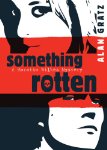Through the Looking Glass Children's Book Reviews
Something Rotten
Fiction
For ages 14 and up
Penguin, 2009 ISBN: 978-0142412978
Horatio Wilkes is going to spend a month with his friend Hamilton Prince this summer. Soon after arriving at Hamilton's mansion home in Denmark, Tennessee, Hamilton takes Horatio to visit the paper plant that is owned by his family. The Elsinore Paper Plant makes the whole of Denmark reek, and Hamilton soon learns that the waste from the plant has also turned the Copenhagen River dark brown, poisonous, and smelly.
When Hamilton goes to visit some friends in the plant they show him a video that his now dead father, Rex Prince, left behind. On the video Hamilton's obviously ill father tells his son that he is being poisoned, that he has "been murdered." Apparently Rex Prince did not want to tell his wife and son what he suspected and now he is gone. Hamilton is sure that he knows who is responsible for his father's death. As far as he is concerned his uncle Claude is the villain in this story. Of course it does not help that Claude has married Hamilton's mother – just months after Rex's death.
Unfortunately, Hamilton's way of dealing with this situation is not very helpful. The young man dives into the bottom of a bottle of booze, and he surfaces only long enough to be rude to his family and downright horrible to his friends. Despite his friend's appalling behavior, Horatio is determined to do what he can to help. He teams up with Hamilton's lovely ex-girlfriend, and he tries to find out what, besides the smell and the river, is rotten in Denmark.
In this thoroughly enjoyable mystery Alan Gratz gives his readers a refreshing and very punchy rendering of the Hamlet story. Unlike Shakespeare's play, this tale puts Horatio in the spotlight instead of Hamlet (Hamilton), and the result is a story that is thoroughly engaging and very true to life. Alan Gratz gets inside the head of his main character to great effect, capturing the essence of teenage concerns and problems very well. He also explores the idea that change for the better can only be brought about if we are willing to do something about it.




